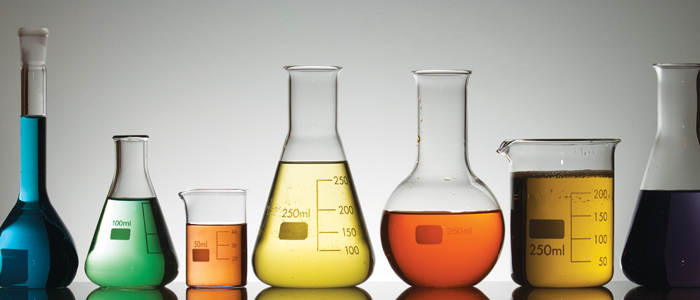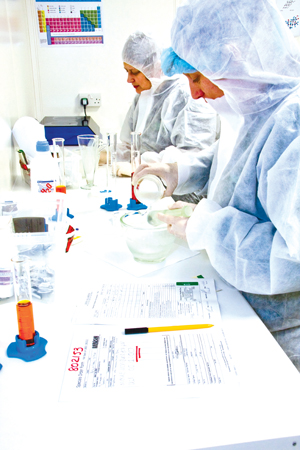An evolving specials market
In Insight
Follow this topic
Bookmark
Record learning outcomes
The specials tariff continues to change prescribing habits, pharmacist's experience of ordering products and the offer from manufacturers. P3 looks at a developing picture.
NHS data shows that there is considerable variation in spending on special order products, for products both on and off the drug tariff. The picture is very different from one CCG to another. In reality this is likely to be the result of a mix of varied prescribing practices, different patient requirements and local cost control measures.

As an overall trend, the NHS is spending less on specials and special obtains. The introduction of a tariff in the sector in England and Wales has decreased spending by over 26 per cent says the Association of Pharmaceutical Specials Manufacturers (APSM). Spend on specials is 1.2 per cent of total spend on all drugs in England and Wales, the equivalent to £1.99 per person in England and Wales per year. Scotland introduced its tariff last year.
Half of pharmacists reported in a 2013 survey that they had been asked to monitor or reduce their specials dispensing (compared with 42 per cent in 2012), and 24 per cent said they had been asked to reduce their spend on specials (compared with 13 per cent in 2012). The Association of Pharmaceutical Specials Manufacturers (APSM) has voiced concerns that pressure from CCGs could compromise quality through continued reduction of prices.
Specials in practice
What's happening in pharmacies? P3 asked the P3 Category Panel about their current experience with specials. Cost control is at the forefront of pharmacists' minds, and achieving this takes some care and time they say.
Lila Thakerar of Shaftesbury Pharmacy in Harrow says that GPs are much more aware of the costs involved in prescribing a special and more ready to change their prescribing practice. 'Doctors want to be reminded of the fact that the prescribed item is a special and, consequently, they often substitute the drug to a cheaper option. Follow-up prescriptions are often not repeated when prescribers are made aware of the prices by the CCGs. A pharmacist's role is crucial in liaising with the GP and agreeing an appropriate treatment that is best value.'
Ordering a special, and keeping an eye on costs, still takes a significant amount of time, despite the tariff, says Nemesh Patel of AMG Pharmacy in Braintree. 'Time permitting, shopping around is still certainly the name of the game here. I always find out when the product will be delivered and, given the significant carriage charges, it is essential that you hold the supplier to this. I have asked for delivery charges not to be invoiced should the supplier fail to deliver within a reasonable timeframe. I work closely with a few trusted suppliers to ensure my customers' needs are never compromised.'
Concerns about the cost of prescribing a special may still be a problem says Dilip Patel of Mirage Pharmacy in Handsworth. He welcomes the greater transparency that the tariff has brought, but suggests this could be extended even further. He has noticed a decrease in the number of special prescriptions. 'We get half a dozen to a dozen specials every month. My feeling is that before the tariff there used to be a lot of specials manufacturers and the pricing of specials was something that needed to be considered very carefully as it wasn't very transparent. I think it would now be helpful if manufacturers could highlight how much it costs them to produce a product: 'it costs us X amount of pounds to run this laboratory, which is why we have to charge X amount for this pot of medicine'. We would then have a much better understanding about why specials companies charge what they do for some of their products.'
Manufacturer view
Costs have continued to decrease, making specials one of many areas of NHS spend where cost savings have successfully contributed to an overall reduction in the NHS budget, says APSM chairperson Sharon Griffiths, managing director of The Specials Laboratory. The tariff is an effective initiative and specials manufacturers continue to invest significant resource in making the system work and in monitoring its effects, she says.
'The tariff is an effective initiative, however the time spent collating data and providing this data to the DH is becoming a significant factor for most specials manufacturers who had not anticipated the amount of time it would take to maintain this level of data. However, overall the tariff has played a positive role in restoring confidence.'
 The stability brought to the market by the measures has been welcomed by all, but some see potential problems for manufacturers in the future as prices continue to fall. The market may be feeling the squeeze. David Francis, sales and marketing director at IPS Specials comments: 'The tariff has grown from 49 product lines to 222 lines in 32 months and we see this will continue to grow. Overall, I think the initiative was a great success and has helped stabilise the specials market, giving prescribers and contactors confidence in specials as well as helping control NHS spend on specials.
The stability brought to the market by the measures has been welcomed by all, but some see potential problems for manufacturers in the future as prices continue to fall. The market may be feeling the squeeze. David Francis, sales and marketing director at IPS Specials comments: 'The tariff has grown from 49 product lines to 222 lines in 32 months and we see this will continue to grow. Overall, I think the initiative was a great success and has helped stabilise the specials market, giving prescribers and contactors confidence in specials as well as helping control NHS spend on specials.
'The only threat I see with the tariff is that we could end up with a Category M situation before long when some lines are not sustainable to manufacture. It is important that the NHS gets value for money, but service and quality must all play an important role in this.'
APSM says that its specials manufacturer members have a strong focus on quality, and the organisation has recently produced a fact sheet on the topic (available at www.apsm-uk.com). In a 2013 survey, APSM found that community pharmacists' confidence that the quality of specials compares with that of licensed medicines grew to 32.7 per cent from 21.5 per cent, showing that some concern still exists.
David Clough of Eaststone Specials is concerned that the high quality of specials offered in the market may not always be appreciated, and points to the reassurance of MHRA manufacturing standards. 'While pharmacy teams are very knowledgeable and clearly understand the need for bespoke unlicenced medicines overall there still seems to be the impression that specials and unlicenced medicines are of a lower quality. This is not necessarily the case and Eaststone and other specials companies have processes and procedures in place which ensure that medicines manufactured in these premises are at the top end of the quality scale according to the MHRA's hierarchy of risk'.
His company is investing in manufacturing capability. 'All Eastston's products are manufactured in a clean room manufacturing suite with full quality processes and procedures in place to ensure our customers can trust the high quality medicines we deliver to them. One way we do this is that we fully check and validate all active pharmaceutical ingredients before they go through to the manufacturing suite. This investment in quality and R&D ensures that the formulations we deliver are of the highest possible quality, and in many cases have an extended shelf life which gives added flexibility to pharmacy and to patients.'
Mr Clough has further concerns that recommendations for patients and carers to crush tablets is gaining ground within CCGs. 'The overall drive on costs, whilst reducing the bill to the NHS for unlicenced medicines, now seems to be driving behaviours within some CCGs and prescribers which is against the best interests of the patient. The MHRA's own hierarchy of risk states that sourcing an unlicenced medicine from a licenced specials manufacturer is preferable to crushing tablets or opening capsules. This may be being ignored by some CCGs in their drive to cut costs.'
Karen Cole, business account manager for Nova Laboratories, agrees that cost and demonstration of quality are key issues for the sector. 'Specials fill a vital niche in delivering tailored healthcare, treating our most vulnerable patients and improving life quality. But the specials industry is only sustainable if it provides good value to its paymasters and can prove the quality of unlicensed medicines.
'As healthcare becomes more tailored to the individual patients, with more specials added to the tariff, pharmacists will get busier and need more support. The manufacturers that can offer a range of special medicines, and offer consultancy services, will be needed more in this time of change. Our dedicated, experienced customer service team resolve many formulation and technical issues. We regularly review our range to offer more products from the tariff at competitive rates. Our development pharmacists help us update and develop new formulations and increase product shelf lives. Our monthly newsletters alert pharmacists to our latest formulation news. We have a next-day delivery service to mainland UK, even same-day when needed, and a standing order service for regular items to make life simpler.'

Claire Lawson, commercial manager for Pharma Nord Specials says that saving cost for the NHS is a clear focus for the company. 'With difficult economic conditions, NHS budgets have been shaken up, with emphasis being placed on reducing the cost of specials. Pharma Nord is working with the NHS on cost-saving initiatives and has secured the first distribution arrangement of its kind in the UK. Local prescribing will vary depending upon the local procedure, legislation and budget of the numerous CCGs and health boards.
'Pharma Nord's company mission is to provide the best quality medication at a fair price to the NHS. We are expanding our specials team to ensure we maintain a personal, dedicated service to our customers, allowing them to meet and exceed the expectations of their patients.'
IPS Specials points to a number of tools that are aimed at helping pharmacists reduce errors and save time. 'Such tools include the Drug Tariff Endorsement Guide which was first introduced by IPS Specials in October 2011 as soon as the new Tariff and Endorsement Guidelines were confirmed for the introduction of the Specials tariff in November 2011. We have continued to update this and also introduced a Dispensing Practices version, as well as one for Scotland when they introduced their Specials Tariff in February last year. We were also the first to create invoice stickers for prescription endorsement and ran a trial in Wales to test the quality and to assess if there were any issues (there was not one single problem out of the 5,000 tested),' says David Francis.
'IPS Specials would also like to remind pharmacists that they can not only get their €one-off€/bespoke manufactured specials from companies like us, but we also manufacture in bulk for large and repeat orders, have a dedicated special obtains department (who are experts in special obtains and will inform you if your order is not eligible for out of pocket before placing the order), and we import medicines from all over the globe, meaning we are truly the complete specials solution.'
A spokesperson for Rosemont says the company has had a strong commitment to pharmacy education for many years and has recently introduced an app. 'We work closely with pharmacists to develop and produce the educational resources they tell us they need. These include swallowing difficulties guidelines, paediatric guidelines, a liquid formulary, and online training resources. Recently we've introduced a Rosemont app, which has been downloaded almost 600 times already.
'A further recent training innovation has been Rosemont's support for the development of a 'swallowing difficulties and medicines' MOOC (Massive Open Online Courses) with the University of East Anglia. The free course has been designed and is being run by the University of East Anglia under the auspices of Professor David Wright, head of medicines management at the university. All of these materials and educational innovations have been produced in response to pharmacy demand, says the company.
'Last year we began changing the packaging of our specials liquid medicines into cartons with a patient information leaflet included in the pack. The repackaging project has been undertaken in response to customer requests and as part of a programme of continual improvement.'
Following on from the experience in England and Wales, manufacturers have equally welcomed the introduction of a drug tariff for unlicenced medicines in Scotland. David Francis of IPS Specials says that the system is working well, though some consider that it may need review. 'The feedback we have received is that the drug tariff is now working well and we have noticed stable pricing. However, for non-drug ariff specials, contractors in some Health Boards are required to obtain three separate quotes and then submit these for approval before they can order. This is an unrealistic expectation of busy pharmacists and we have had reports that it is a painful experience €“ particularly for prescriptions which come in before 9am or after 5pm and on weekends. I understand that NHS Scotland is assessing their procedures though and will obviously continue to develop the process based on key learnings.'
David Clough of Eaststone agrees: 'The drug tariff for unlicensed medicines in Scotland seems to be working well, but the requirement to get three quotes before product is ordered can delay patients from getting their medication in a timely manner.'
Support for pharmacists
The APSM has been particularly busy in the sector since the introduction of the tariff says newly appointed chairperson Sharon Griffiths. 'The APSM plays an important role in the promotion of best practice within the specials sector and is increasingly called upon to consult on legislation and guidance. Part of my role will be to steer the APSM through a process of transition to be a more proactive participant in the pharmaceutical industry and to work with our stakeholder groups to find better ways to support clinicians and patients.'
APSM welcomed GPhC guidance published in May for pharmacists preparing unlicensed medicines. 'Although extemporaneous preparation (Section 10 exemption) is only intended for use in emergencies, it is nonetheless an essential part of the overall specials supply chain.' In the guidance the GPhC say that community pharmacy staff must communicate with patients to ensure they have all of the information they require about the unlicensed medicine and ensure that appropriate standards are in place for preparation.
Pharmacists and pharmacy teams welcome any support that can be offered by manufacturers in helping them to understand specials in more detail, she suggests. In the 2013 APSM survey, 42 per cent of pharmacists agreed or strongly agreed with the statement 'I don't feel I have enough experience about unlicensed medicines,' she said.
'Many pharmacists, by their own admission, have little experience of extemporaneous preparation and, in fact, are only called upon to dispense specials less than 10 times a month. Most will opt to order from a specials manufacturer, but they still have a duty of care around product quality and also sufficient knowledge to be able to confirm that there is no licensed product available to meet the patients' needs €“ or indeed if there is any other reason why the special prescribed might be inappropriate. The specials industry has a role to provide education and advice to help pharmacists.'
